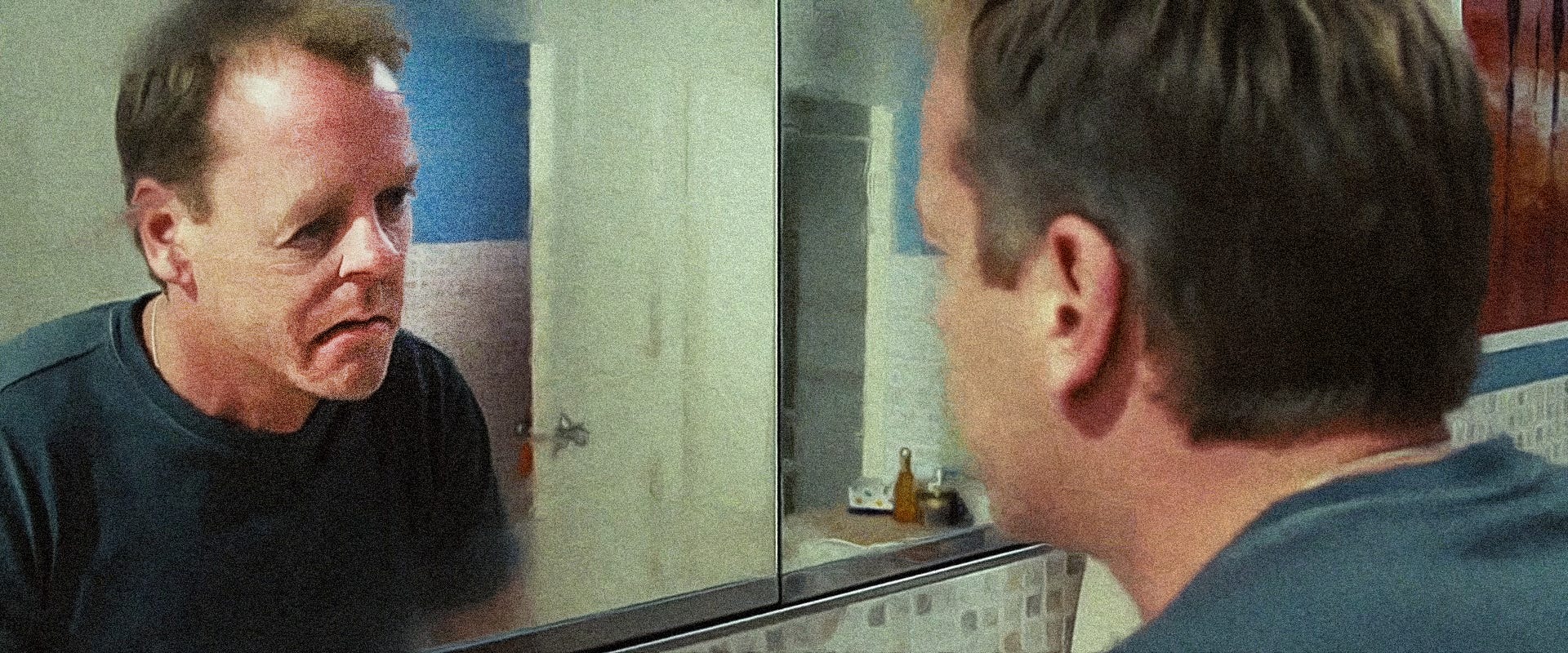Horror Aughts: ‘Mirrors’s Unabashed Gore is Still a Delight
Alexandre Aja will Alexandre Aja
‘Horror Aughts’ is a column in which I revisit scary movies from the 2000s that were big commercial hits at the time but have been largely forgotten ever since.
You never forget your first Alexandre Aja horror. Mine was the mean and appallingly brutal Haute Tension (unnecessarily retitled Switchblade Romance) at a time when I had no clue that French horror auteurs were freaking insane. I wasn’t familiar with New Extremity Films (or the Splat Pack), and Aja’s ruthless slasher was a shocking introduction to the subgenre. The arousing, uncompromising, and over-the-top brutality felt new and bold in a way that immediately touched my gore-loving heart, and I wanted to see more of the same.
Mirrors followed Aja’s best work, the merciless remake of The Hills Have Eyes, and by then, I was already a fan. Though his second remake (based on the South Korean Into the Mirror) might be the weakest of the three he made, it’s another unapologetically vicious and characteristic vision of the writer-director, which aged far better than one would expect. There are just not many horrors today that open with a man slitting his own throat in front of a mirror, committing to a raw ultra-violence right from the bat that instantly defines the approach of a story that you’re about to see unfold. Aja was never one to mislead or bait his audience.
That said, Mirrors’s plot begins slowly, carefully developing a protagonist who doesn’t necessarily need to be all that complicated. Ben Carson (Kiefer Sutherland relying on his tortured-soul schtick) is a suspended detective and recovering alcoholic with a broken marriage. Haunted by a mistake that cost his job and family, he’s struggling to find a way to repair the damage. Not for the lack of trying, though: he’s off the booze and starting a new job as a night security guard at the Mayflower, a luxury department store that burned down five years ago and which, for some reason, still needs to be watched. The place is filled with giant mirrors and an ominous, unnerving energy that quickly cracks Ben’s already emotionally fragile state of mind. We know that something kooky is going on in the building, and it doesn’t take long until our hero starts to go crazy as some wild hallucinations begin to occur in the reflections. Demons are in da freakin’ house, my friends, and soon they start living rent-free in Ben's spiraling mind, too.
It's quite a standard setup as far as demonic possession horrors go, but Aja finds enough meat to stuff the original’s premise with an intriguing backstory that becomes the spine of the film. Ben’s investigation into the building’s history (and his predecessor’s grisly death) leads us down a rabbit hole that offers all kinds of paranormal and psychological shenanigans. That’s where the writer-director’s touch of brutality comes into play. Aja doesn’t exactly aim for scares but rather utilizes shock value as a provocation of how much gore one can take and endure. I mean, who could forget Amy Smart's naked “jaw-breaking exercise” as she agonizingly drops dead in a bath full of bubbles and blood? That’s a classic Aja scene if I’ve ever seen one.
Naturally, there’s more where that came from, and Sutherland confidently leads the way as Ben grows more paranoid and obsessed with exposing the entity behind the mirrors. He’s a master at playing a lunatic who isn’t actually a lunatic and that’s on full display here. The director knew how to get the most out of him, which, even if it’s far from his best, is the main reason Mirrors still works 16 years later. It’s also a pleasant surprise how well the mix of special and practical effects hold up (especially on a $35 million budget), but Aja's expertise in making them seamless certainly plays a vital role in their effectiveness.
Where the writing lacks finesse, though, is conveying the emotional stakes that are solely here as mandatory elements of such a story, bearing little to no weight. Whatever happens (or doesn't happen) to Ben’s family is rather collateral damage than anything profound to relate to, but that's true for most 2000s B horrors that usually prioritize plot and jumpscares, not characters. So the ending — a classic mean and unhappy one — appeals more to us on a meta-level as a badass move from Aja than in the context of the narrative. Still, it’s another proof that the French auteur refused to give in to conventional storytelling and went for whatever he thought would shock the audience the most.
For the record, I must mention that Mirrors wasn’t a box office success in the U.S. but managed to double its budget worldwide, bringing in over $47 million internationally, and ending up garnering $78 million in total. Evidently, Aja knew his audience back then and had a knack for giving them what they wanted. These days, he’s more hit or miss, but I still find his movies pretty engaging. The 2008 remake wasn’t a career highlight for him by any stretch, but after this rewatch — and the current state of the demonic possession subgenre — I’m maybe not too out of line to say that Mirrors is more underrated than it should be.
You can find every entry of the Horror Aughts column here. As always, thanks for reading and supporting The Screen.




i love this series of posts but as someone who has a lot of mirror issues (maybe mental illness, maybe demonic in origin) i fear that this movie will cause me to smash the remaining mirrors in my house. still gonna have to watch though because somehow i missed this in the aughts.